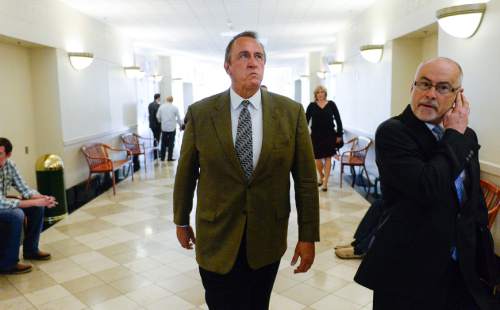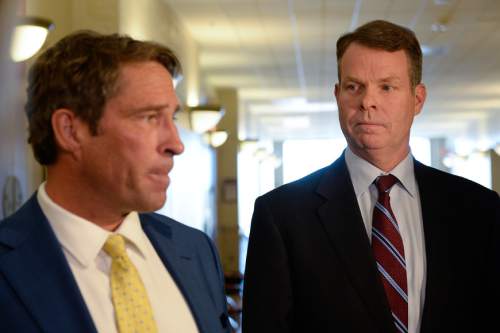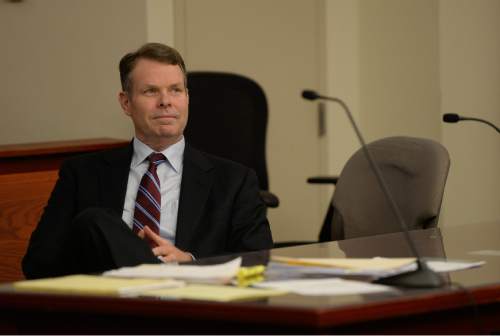This is an archived article that was published on sltrib.com in 2016, and information in the article may be outdated. It is provided only for personal research purposes and may not be reprinted.
Former Utah Attorney General John Swallow is pressing a state judge for an evidence hearing, alleging in court papers Thursday that investigators may have lied or manipulated the facts when seeking the search warrants that gave them access to his computers and email.
State and federal investigators, along with the Salt Lake County district attorney's office, also may have failed to use — or misused — a "taint team" to filter out Swallow's privileged communications with a private attorney, court documents say. When Swallow challenged the issue, prosecutors appear to have investigated themselves, rather than seek an outside review.
"While such an approach may be unsurprising in Russia or Iran, it defies basic notions of fairness and fundamental due process that are the underpinnings of the criminal justice system in the United States," according to the papers filed in Salt Lake City's 3rd District Court.
The allegations from Swallow's lawyer, Scott C. Williams, are the latest twists in a battle over the need for an evidence hearing as the former officeholder seeks dismissal of the multiple corruption charges he faces.
It's also the second time in a week that questions have been raised about the accuracy of the investigative subpoenas used in the criminal cases filed against Swallow and his predecessor, former three-term Attorney General Mark Shurtleff.
Salt Lake County District Attorney Sim Gill said he had not seen the filing Thursday evening and could not comment on its specific allegations. However, Gill said he expects the issues will be addressed during the hearing on the motion to dismiss, scheduled for July 13.
"If there is something new or novel being raised [by Swallow], we will review it and address it," Gill said. "I think it would be premature of me to second-guess anything before court. That's why we have the process."
Agents from the Utah Department of Public Safety (DPS) and the FBI conducted the investigative work the former officials are challenging. Both agencies declined to comment on the allegations Thursday.
Williams asked 3rd District Judge Elizabeth Hruby-Mills to toss out the case in April, asserting that Gill's office violated Swallow's constitutional rights when it seized and used emails exchanged between the former Utah attorney general and his lawyer at the time.
State and federal agents gathered the emails, numbering more than 12,000, over the course of the investigation in 2012 and 2013.
Gill has said no one in his office read or used the materials and that no evidence hearing is necessary.
Swallow has pleaded not guilty to 14 felony and misdemeanor charges, including counts of money laundering, misuse of public funds, obstruction of justice and falsifying government records.
No trial date is set. If convicted, Swallow faces up to 30 years in prison.
Court papers place much of Swallow's mistrust at the feet of Scott Nesbitt, the DPS investigator who signed the search warrants.
"Agent Nesbitt cannot be believed," Williams wrote. "On prior occasions, he has provided false and-or misleading information, and-or made material omissions in affidavits to the courts regarding the investigation into this case."
Williams included two exhibits in Thursday's filing that suggest prosecutors had been told Nesbitt may not be reliable.
One is an excerpt from an interview Gill's office conducted with Swallow associate Jeremy Johnson, a St. George businessman who said he was "upset" after reading the search warrants because Nesbitt appeared to be using information selectively.
"And he was drawing a picture that was different than what I had told him," Johnson, who was convicted in March on federal bank charges, states in the document.
The second is a letter from a lawyer representing members of Swallow's campaign staffers, including Jason Powers. It details instances in which they say Nesbitt failed to verify dates and legal facts related to IRS rules regarding campaign finances.
In his letter to authorities — sent in January 2014, about six months before Swallow was charged — attorney Walter Bugden wrote, "it seems clear that information presented to the judge contains a fundamental misunderstanding" and appears to be either a "falsity or a reckless disregard for the truth."
Shurtleff's attorneys raised similar allegations about investigators a week ago, when they asked the court to dismiss his pending parallel case.
Swallow's latest filing also raises questions about the actions of FBI Special Agent Jon Isakson.
Williams says Isakson has acknowledged the existence of a "taint team," but that evidence log records suggest the agent "purposefully sidestepped the process" when he searched Swallow's computers.
"It remains a mystery as to if and how the purported 'taint team' referenced by the state operated," Williams wrote.
Emails also show that Gill failed to provide any direction to the taint team, court papers say, and there are conflicting reports about the size of that team.
Prosecutors' communications suggest the team had 11 members, while FBI emails say two agents were assigned to the team, according to the documents.
"Prejudice must be presumed," Williams wrote, and the case should be dismissed or an evidentiary hearing must be held.
Twitter: @jenniferdobner







